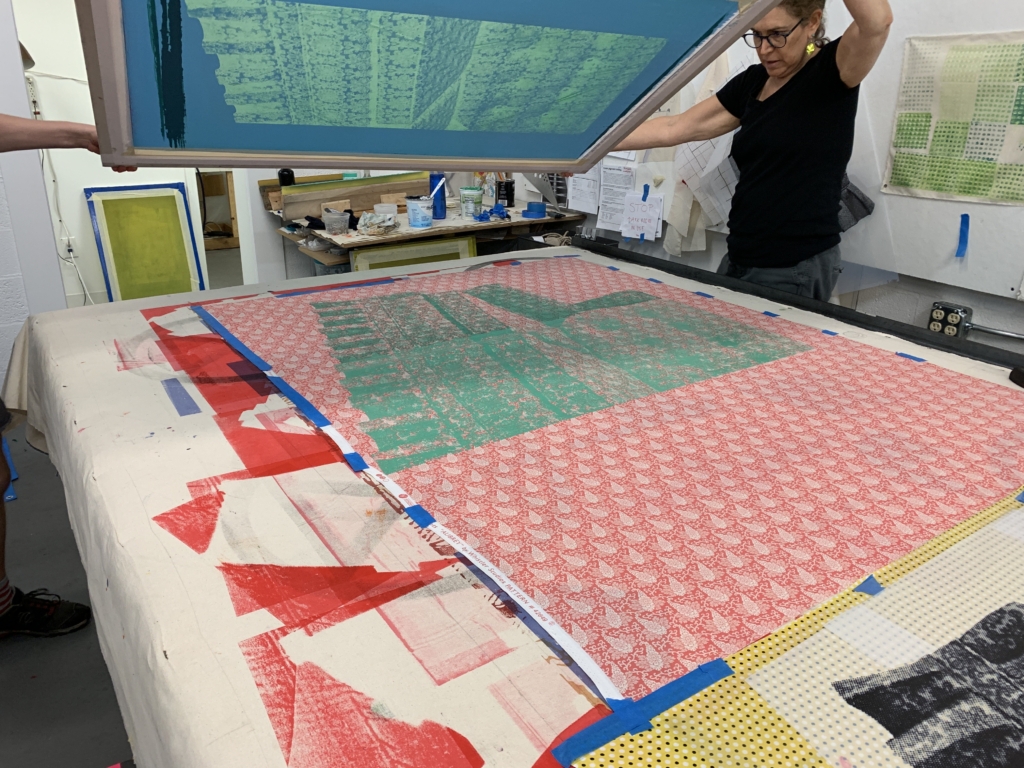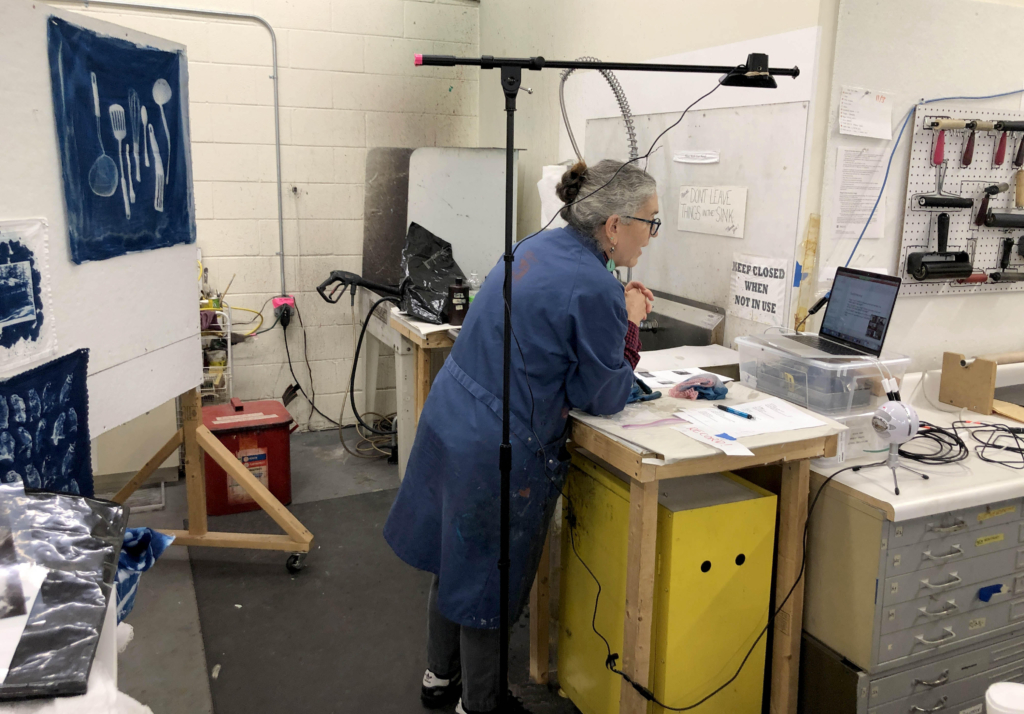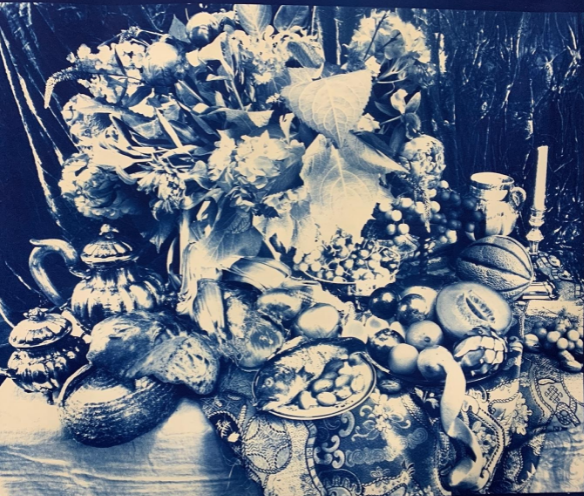Ungathered
September 29 – October 31, 2021
First Friday reception: October 1, 5-8:30pm
Artists’ Reception: Saturday, October 16, 4-6pm, artist talk from 5-6pm
Boston Sculptors Gallery
486 Harrison Avenue, Boston, MA 02118
617-482-7781
Gallery Hours
Wed-Sun 11-5pm, or by appointment
I’m very pleased to announce my solo exhibition, Ungathered will be on view at Boston Sculptors Gallery, September 29 through October 31. The opening reception will be October 1, from 5-8:30 pm.
Here is a preview some of the work and my artistic process though images, and in conversation with my friend and fellow artist Leah Gauthier.
Leah: Hi Liz! Can you tell us a bit about Ungathered?
Liz: This exhibition is essentially a rather large installation made up of many parts that have meaning seen as part of the whole and on their own. It re-envisions the Thanksgiving table, as I experienced it in November 2020, a place in disarray with many elements missing or in a state of confusion due to the pandemic. The table is missing altogether but implied by suspended placemats and papier mâché dishes. Floating two-dimensional steel frame chairs and images of chairs silkscreened on sheer fabric suggest the absence of dinner guests. Paper objects are covered with images of other significant memories of 2020: BLM protests and people looking out from computer screens on Zoom calls, further memorializing the chaos of the time. In the making of this work it was important for me to try to convey how difficult the day was.
Leah : I remember the exact moment just before the initial lockdown, when I felt it in my bones that Covid was about to make a huge impact on our lives. Can you remember what you were thinking and feeling just before we all went into isolation?
Liz : I am usually terrible at remembering dates, but I had been to a gallery opening for First Friday in March, the 6th, and that Saturday morning our son, who is immunosuppressed, came to live with us. He had done some research and told us that we were facing at least 18 months of lock down. My first thought was that I wouldn’t be able to go to my studio and the thought that I wouldn’t be able to make my work absolutely gutted me. And just a beat later I realized that we would be cut off from the world, unable to even go out to buy groceries. We didn’t have much food in the house. I was ashamed that I was so devastated because my mind went to people and places in the world where people always live with food insecurity. A week or so later I started to feel sick. I had contracted Covid at the First Friday opening.
Leah: How did those first months of solitude impact your life, your art practice, and your print studio? Was the time artistically productive?
Liz: I started making masks for front line workers almost immediately. It wasn’t an act of generosity; I needed to be busy. I had no materials at home except a stash of fabric and a sewing machine. Those masks were terrible. I could barely follow the online instructions. Within days I realized that I was sick with Covid and had to be quarantined. The isolation was brutal; it was 3 weeks (because of testing unavailability) alone in a bedroom, my meals left at the door. This was mid – March 2020.
When we partially reopened the studio four months later, I was so disoriented that I couldn’t pick up my work where I had left off. We spent a lot of time and energy trying to manage Covid in our space: the scheduling, cleaning, and worrying. I spent an enormous amount of time learning how to teach on Zoom. Being artistically productive didn’t seem possible.
The interesting thing is not my Covid experience but that everyone, everywhere has had similar stories of fear and isolation and, incredibly, we are still trying to manage our lives in a global pandemic.
Leah: This past year and a half not only were we dealing with the fallout of covid, but also the widespread protests after the murder of George Floyd, the Big Lie around the election, the violent insurrection at the Capitol and catastrophic natural disasters. It’s a heavy time to be an artist in so many ways, what are you creatively focused on right now? What gifts can the arts bring to the world in turbulent times?
Liz: I was interested in incorporating images of BLM protests, etc. into the papier – mâché pieces to consider how we coped with the grueling day to day reality of 2020. By placing BLM protest images in the middle of my dinner plates I am making them into commemorative plates, which puts the protests of the murder of George Floyd and so many others, on an equal footing with other universally acknowledged historical events.
People are exhausted by the pandemic and the upheaval surrounding the election. It is understandable to want to put it behind us. In my work, I am asking us to remember, not to take any of it for granted: our democracy, health, family. Preserving and framing history is often a good thing that the arts do. That is not an act of generosity on my part, as the word “gift” implies. Because we have the public’s attention I think we are obligated to continue the protest after the signs are thrown out and people go home from the marcchanged and are just like anyone else’s. It is always about how to find time, materials, space and pay the bills.
Leah: Could you tell us about your missed 2020 Thanksgiving. What did you do on that day? How was it different than in more normal times? How did you connect with loved ones? What are your plans for this year?
Liz: People have told me that they were ok with Thanksgiving 2020. They savored the quiet time, not missing all the bother of having a big family meal. For me, it was a day of mourning. I missed my parents and family members who have drifted away, as well as those who couldn’t travel to us due to Covid. I missed getting out all the fussy china that past generations collected and left to me. Aside from a handful of photos and incomplete stories, these things are all I have of them. This year I will be grateful for whatever gathering we can have.
I was raised with the big Thanksgiving lie, that the day was about fellowship and generosity, of course no mention of stolen land and smallpox. In my work I am trying to remind people of what it felt like to be isolated and frightened. Might they be more open handed and inclusive post Covid? My experience changed me.
To be continued . . .




